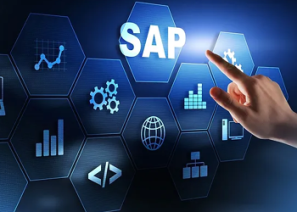Boost Financial Reporting with SAP FSCM Insights
SAP FSCM Training || SAP FSCM certification Training || SAP FSCM Online training || SAP FSCM self-paced training || SAP FSCM Instructor-Led training
Key Features of Training:
- 30 Hrs Instructor-led Training
- Mock Interview Session
- Project Work & Exercises
- Flexible Schedule
- 24 x 7 Lifetime Support & Access
- Certification and Job Assistance
FSCM(Financial Supply Chain Management):
SAP FSCM (Financial Supply Chain Management) is a set of financial management tools and processes offered by SAP that enables organizations to manage their cash flows, credit risk, and collections more efficiently. SAP FSCM helps organizations to optimize their financial supply chain by automating and streamlining financial processes, reducing manual work, and improving cash flow and profitability. The SAP FSCM module includes various sub-modules, such as Treasury and Risk Management, Cash and Liquidity Management, Credit Management, Collections Management, and Dispute Management. Each sub-module provides specific functionality that helps organizations manage their financial supply chain effectively.
Prerequisites: Who can attend SAP FSCM Training?
- Basic knowledge of financial accounting concepts and principles.
- Familiarity with SAP ERP (Enterprise Resource Planning) system.
- Understanding of business processes related to financial supply chain management, such as cash flow management, credit management, and
- collections management.
- Familiarity with SAP FICO (Financial Accounting and Controlling) module is preferred but not mandatory.
- Good Communication Skills
Responsibilities of SAP FSCM Consultant
- Analyzing business processes
- Implementing SAP FSCM modules
- Conducting workshops
- Providing training and support
- Collaborating with other teams
Course Benefits
- Job opportunities
- Promotion opportunities (Salary Hike)
- Increased productivity
- Improved decision-making
- Gain in-demand skills
What is future of SAP FSCM Consultant?
- Digital transformation
- Data analytics
- Compliance and risk management
- Customer experience
- Emerging technologies
The fee for SAP FSCM(Financial Supply Chain Management) training can vary depending on several factors such as the location, duration of the course, training format, and level of expertise. SAP offers various training options for FSCM, including instructor-led courses, e-learning courses, and virtual live classrooms.
For More details you can Register
SAP FSCM(Financial Supply Chain Management) Certification FAQ's:
1. What is SAP FSCM certification?
A: SAP FSCM certification is a credential that validates an individual's expertise in implementing and managing SAP FSCM modules. The certification demonstrates the individual's knowledge and skills in areas such as credit management, collections management, dispute management, and treasury and risk management.
2. What are the prerequisites for SAP FSCM certification?
A: There are no specific prerequisites for SAP FSCM certification. However, it is recommended that candidates have experience working with SAP FSCM modules and knowledge of financial management processes.
3. How do I prepare for SAP FSCM certification?
A: There are various ways to prepare for SAP FSCM certification, including attending training courses, studying official SAP FSCM materials, and practicing with SAP FSCM software. It is also recommended that candidates have practical experience working with SAP FSCM modules.
4. How do I register for SAP FSCM certification?
A: To register for SAP FSCM certification, you will need to create an account on the SAP website and follow the registration process. You will also need to pay the certification fee and meet any other requirements specified by SAP.
5. What is the format of the SAP FSCM certification exam?
A: The SAP FSCM certification exam consists of multiple-choice questions and has a time limit of three hours. The exam is available in several languages and can be taken online or in person at a testing center.
6. How long is SAP FSCM certification valid for?
A: SAP FSCM certification is valid for two years. After two years, individuals will need to renew their certification by taking a recertification exam or completing other requirements specified by SAP.
7. What are the benefits of SAP FSCM certification?
A: SAP FSCM certification can provide several benefits, including increased job opportunities, higher salary potential, and recognition of your expertise in SAP FSCM modules. The certification can also demonstrate your commitment to professional development and ongoing learning.
8. How much does SAP FSCM certification cost?
A: The cost of SAP FSCM certification varies depending on the location and currency of the exam. As of April 2023, the cost of the exam is typically between 500-650 USD.
9. What is the passing score for SAP FSCM certification?
A: The passing score for SAP FSCM certification varies depending on the exam, but it is typically around 60%. However, SAP does not disclose the exact passing score.
10. How long does it take to get SAP FSCM certification?
A: The length of time it takes to get SAP FSCM certification depends on various factors, such as the amount of time you dedicate to studying and preparing for the exam, your previous experience with SAP FSCM modules, and the availability of certification exam slots. On average, candidates should expect to spend several weeks or months preparing for the exam.
SAP FSCM(Financial Supply Chain Management) Certification:
SAP FSCM (Financial Supply Chain Management) certification is a credential that validates an individual's expertise in implementing and managing SAP FSCM modules. SAP FSCM is a set of integrated solutions designed to optimize financial processes and improve cash flow in the supply chain.
The certification demonstrates the individual's knowledge and skills in areas such as credit management, collections management, dispute management, and treasury and risk management. It is designed for professionals who work with SAP FSCM modules and want to validate their skills and knowledge.
To become certified in SAP FSCM, candidates must pass a certification exam. The exam consists of multiple-choice questions and has a time limit of three hours. The passing score for SAP FSCM certification varies depending on the exam, but it is typically around 60%.
SAP FSCM(Financial Supply Chain Management) Curriculum:
1. Overview of SAP FSCM
- Introduction to Financial Supply Chain Management
- Key features and benefits of SAP FSCM
- Integration with other SAP modules
2. SAP FSCM Credit Management
- Overview of credit management in SAP FSCM
- Creation of credit master data
- Credit limit checks and credit scoring
- Credit decision making and approval process
- Management of credit exposure
3. SAP FSCM Collections Management
- Overview of collections management in SAP FSCM
- Creation of customer accounts
- Management of overdue accounts
- Management of payment plans and installment agreements
- Integration with billing and accounts receivable
4. SAP FSCM Dispute Management
- Overview of dispute management in SAP FSCM
- Creation of dispute cases
- Management of dispute resolution process
- Integration with accounts receivable and billing
5. SAP FSCM Treasury and Risk Management
- Overview of treasury and risk management in SAP FSCM
- Management of cash and liquidity
- Risk analysis and mitigation
- Hedging and exposure management
- Integration with financial accounting and other SAP modules
6. SAP FSCM Biller Direct
- Overview of biller direct in SAP FSCM
- Creation of customer accounts
- Management of electronic invoices and payments
- Integration with accounts receivable and billing
7. SAP FSCM In-House Cash
- Overview of in-house cash management in SAP FSCM
- Management of internal cash flows and payments
- Optimization of cash balances and interest income
- Integration with financial accounting and other SAP modules
8. SAP FSCM Credit Risk Management
- Overview of credit risk management in SAP FSCM
- Creation of credit risk profiles
- Analysis of credit risk exposure
- Management of credit risk mitigation strategies
- Integration with credit insurance and other external sources
9. SAP FSCM Financial Shared Services
- Overview of financial shared services in SAP FSCM
- Management of financial processes across multiple entities
- Standardization of financial processes and reporting
- Optimization of shared services costs and efficiency
SAP FSCM(Financial Supply Chain Management) Interview Questions & Answers:
1. What is SAP FSCM, and what are the main modules in it?
A: SAP FSCM (Financial Supply Chain Management) is a set of solutions that help organizations manage their financial processes related to the supply chain. The main modules in SAP FSCM are Cash and Liquidity Management, Credit Management, Collections Management, Dispute Management, Electronic Invoice Presentment and Payment (EIPP), and Treasury and Risk Management.
2. What is the difference between SAP FSCM and SAP FI (Financial Accounting)?
A: SAP FSCM focuses on financial processes related to the supply chain, while SAP FI (Financial Accounting) focuses on financial accounting processes within an organization, such as general ledger accounting, accounts payable, and accounts receivable.
3. What are the benefits of implementing SAP FSCM in an organization?
A: Implementing SAP FSCM can help organizations improve cash flow, reduce credit risk, streamline collections processes, resolve disputes more effectively, and automate invoice processing.
4. What is cash positioning in SAP FSCM, and how does it work?
A: Cash positioning is a feature in SAP FSCM that helps organizations monitor their cash balances and forecast their future cash positions. It works by consolidating cash data from multiple sources, such as bank statements and other financial systems, and providing a real-time view of cash positions.
5. What is credit scoring in SAP FSCM, and how does it work?
A: Credit scoring is a feature in SAP FSCM that helps organizations assess the creditworthiness of their customers. It works by assigning a numerical score to each customer based on factors such as payment history, credit utilization, and financial stability.
6.What is the role of electronic payment processing in SAP FSCM?
A: Electronic payment processing is a key feature of SAP FSCM that allows organizations to process payments electronically, reducing manual processing times and errors. It can also help improve cash flow by enabling faster payment processing and reducing payment delays.
7. What is dispute management in SAP FSCM, and how does it work?
A: Dispute management is a feature in SAP FSCM that helps organizations manage disputes with their customers. It works by providing a centralized system for tracking and resolving disputes, including features like case management, root cause analysis, and dispute resolution workflows.
8. What is EIPP in SAP FSCM, and how does it work?
A: Electronic Invoice Presentment and Payment (EIPP) is a feature in SAP FSCM that allows organizations to present and receive invoices electronically. It works by integrating with other financial systems to automate invoice processing, validation, and payment.
9. What is treasury and risk management in SAP FSCM, and how does it work?
A: Treasury and risk management is a feature in SAP FSCM that helps organizations manage financial risks, such as currency fluctuations, interest rate changes, and commodity price volatility. It works by providing tools for analyzing and managing financial risks, including features like hedging, risk reporting, and market data analysis.
10. What is Collections Management in SAP FSCM, and how does it work?
A: Collections Management is a feature in SAP FSCM that helps organizations streamline their collections processes. It works by providing a centralized system for managing customer accounts that are past due, including features like dunning letters, customer communication, and dispute management workflows.
11. What is the integration between SAP FSCM and other SAP modules?
A: SAP FSCM can be integrated with other SAP modules like SAP ERP (Enterprise Resource Planning) and SAP CRM (Customer Relationship Management) to streamline financial processes across the organization. For example, integrating SAP FSCM with SAP ERP can help organizations automate invoice processing and improve cash flow management.
12. What is the difference between a dunning letter and a collection letter in SAP FSCM?
A: A dunning letter is a communication sent to a customer to remind them of an overdue payment and request payment. A collection letter is a communication sent to a customer after multiple dunning letters have been sent, indicating that further action may be taken if payment is not received.
13. What is the importance of credit limit management in SAP FSCM?
A: Credit limit management is important in SAP FSCM because it helps organizations reduce credit risk by setting limits on how much credit a customer can use. This helps prevent customers from overextending their credit and defaulting on payments.
14. What are the key features of SAP FSCM's cash and liquidity management module?
A: Key features of SAP FSCM's cash and liquidity management module include cash forecasting, cash positioning, liquidity planning, and bank account management. These features help organizations manage their cash flow more effectively and optimize their liquidity positions.
15. What is root cause analysis in SAP FSCM's dispute management module, and why is it important?
A: Root cause analysis is a feature in SAP FSCM's dispute management module that helps organizations identify the underlying causes of disputes with customers. It is important because it can help organizations address the root cause of the dispute and prevent similar disputes from occurring in the future.
16. What is the difference between SAP FSCM and SAP Ariba?
A: SAP FSCM focuses on financial processes related to the supply chain, while SAP Ariba focuses on procurement and sourcing processes within an organization. However, the two solutions can be integrated to streamline financial and procurement processes across the organization.
17. What is the role of the SAP FSCM consultant, and what skills do they need to have?
A: The role of an SAP FSCM consultant is to help organizations implement, configure, and customize SAP FSCM solutions to meet their specific financial supply chain management needs. They need to have strong knowledge of SAP FSCM modules and features, as well as a good understanding of financial processes related to the supply chain. Additionally, they should have good communication and problem-solving skills, as well as the ability to work collaboratively with stakeholders across the organization.
18. How can organizations measure the success of their SAP FSCM implementation?
A: Organizations can measure the success of their SAP FSCM implementation by tracking key performance indicators (KPIs) related to financial supply chain management, such as cash flow, credit risk, collections performance, dispute resolution times, and invoice processing times. Additionally, they can conduct user surveys to gather feedback on the usability and effectiveness of the SAP FSCM solution.
19. What is the difference between on-premise and cloud-based SAP FSCM solutions?
A: On-premise SAP FSCM solutions are installed and hosted locally within an organization's IT infrastructure, while cloud-based SAP FSCM solutions are hosted on the cloud by a third-party provider. On-premise solutions offer more control over data and security, but require more upfront investment in hardware and infrastructure. Cloud-based solutions offer more flexibility and scalability, but may have limited customization options and data control.
20. How can SAP FSCM help organizations optimize their working capital?
A: SAP FSCM can help organizations optimize their working capital by improving cash flow management, reducing credit risk, and streamlining collections processes. By having a better understanding of their cash positions and creditworthiness of their customers, organizations can make more informed decisions about how to manage their working capital more effectively.
Participants will have 24/7 access to our online lab, providing hands-on experience with SAP FICO tools and scenarios.
This includes server access to S/4 HANA 2023 for 1 year, ensuring you have ample time to practice and apply your skills in a real-world environment.
With this extended access, you can work on projects, explore advanced features, and solidify your understanding of SAP FICO in the latest SAP S/4 HANA version.















